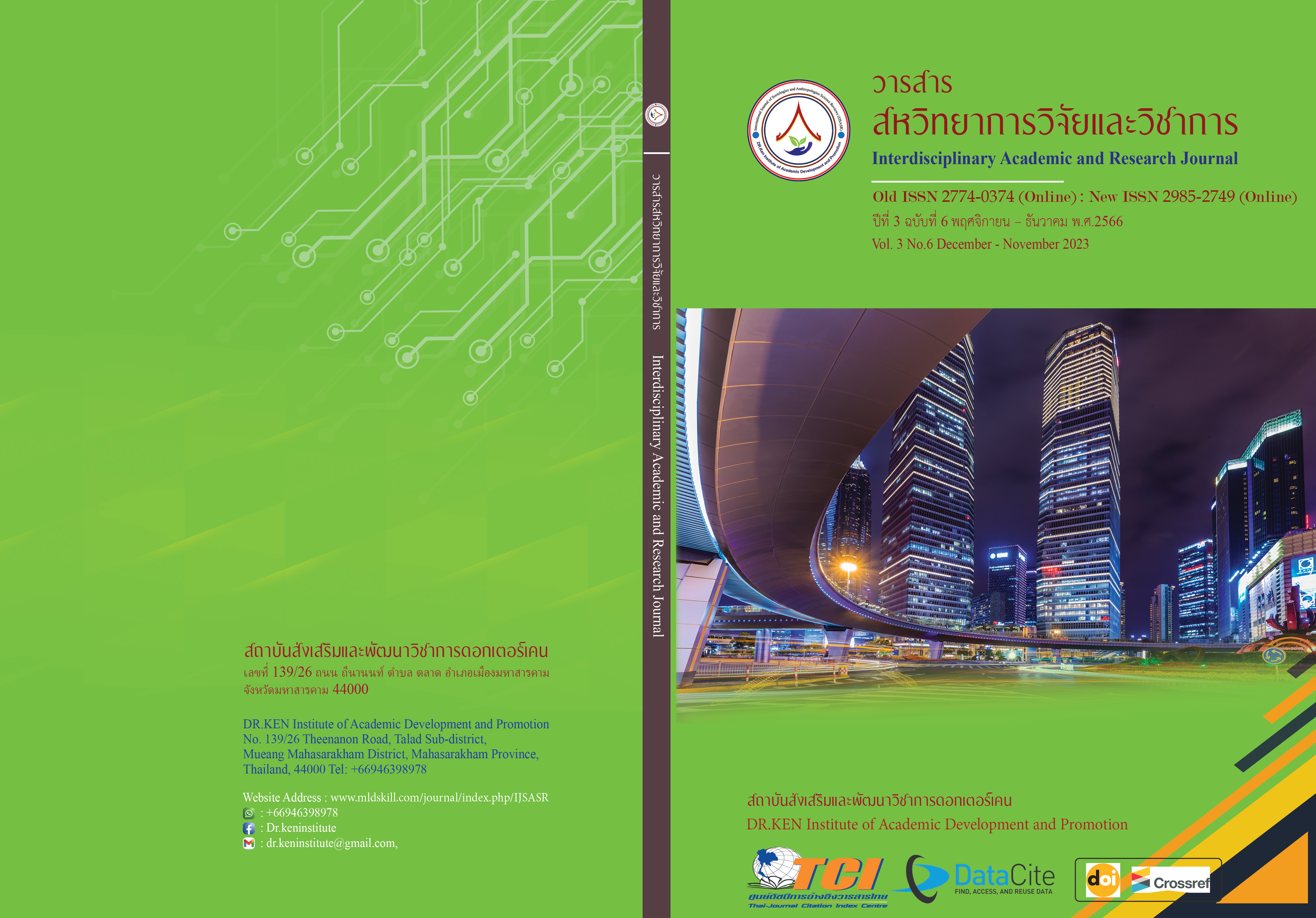Creative Problem Solving (CPS) Learning Management
DOI:
https://doi.org/10.60027/iarj.2023.271089Keywords:
Learning Management Format;, Learning Management Process; , Public MediaAbstract
Background an Aims: Creative problem-solving management is one of the learning frameworks that focus on fostering students' creativity and creative problem-solving by focusing on developing critical thinking skills and solving problems creatively on their own. This is an essential skill to grow and succeed in an intimate life in today's fast-paced society. The purpose of this research was to synthesize a creative problem-solving learning management model.
Methodology: The researcher uses the research methodology by studying academic papers, which studies relevant academic papers, then synthesizes them to create a creative problem-solving learning management approach with explanatory and synthetic presentations. It is an explanatory diagram.
Results: (1) The creative problem-solving learning management model consists of; (1.1) Creative Thinking, (1.2) Problem-Solving Skills, (1.3) STEM Creativity, (1.4) Project-Based Learning, (1.5) providing challenging and creative problems, (1.6) Promoting group work and exchange of ideas, (1.7) Support and develop critical thinking and decision-making skills, (1.8) Encourage learners to have wisdom and open vision. In addition, (2) the creative problem-solving learning management process includes; (2.1) Recognizing the problem, (2.2) Analyzing the problem, (2.3) Inventing a solution, (2.4) Consolidating the problem, (2.5) Testing and improving, and (2.6) Observing the solution.
Conclusion: The research emphasizes the importance of a comprehensive and effective problem-solving creative learning approach. This approach not only involves stimulating creativity and independent learning but also integrates key elements such as collaborative teamwork, analytical thinking, and open-mindedness. The proposed framework incorporates a systematic problem-solving process, ensuring a holistic and impactful learning experience for learners.
References
Andriani, E. (2021). Penerapan Model Pembelajaran Creative Problem Solving (CPS) untuk Meningkatkan Hasil Belajar Siswa Kelas V/A di SDN Ambulu 01 Kabupaten Jember Tahun Pelajaran 2019/2020. PTK: Jurnal Tindakan Kelas, 2(1), 40-51. https://doi.org/10.53624/ptk.v2i1.46
Armia, A., Molle, J.S., & Tamalene, H. (2021). PENGARUH RESPONS SISWA PADA MODEL PEMBELAJARAN CREATIVE PROBLEM SOLVING (CPS)TERHADAP KEMAMPUAN PEMECAHAN MASALAH MATEMATIKA. Jurnal PEKA (Pendidikan Matematika). 5 (1), 18-26. DOI: https://doi.org/10.37150/jp.v5i1.1269
Bahr, M. W., Walker, K., Hampton, E. M., Buddle, B. S., Freeman, T., Ruschman, N., Sears, J., Mckinney, A., Miller, M., & Littlejohn, W. (2006). Creative Problem Solving for General Education Intervention Teams: A Two-Year Evaluation Study. Remedial and Special Education, 27(1), 27–41. https://doi.org/10.1177/07419325060270010401
Chaiyasit, S., & Somphong, N. (2020) Development of Creative Problem-Solving Learning Model on Intelligent Instructional Innovation System to Enhance Creative Thinking Skill of Undergraduate Students, NRRU Community Research Journal 14 (2), 148-162.
Chen, P., & Chang, C.Y. (2021). Enhancing Creative Problem-Solving in Postgraduate Courses of Education Management Using Project-Based Learning. International Journal of Higher Education. 10 (6), 11-21; DOI: https://doi.org/10.5430/ijhe.v10n6p11
Doungwilai, D. (2017). Developing learning management with local wisdom integration to improve reading and writing skills. New Trends and Issues Proceedings on Humanities and Social Sciences, 4(1), 317–322. https://doi.org/10.18844/prosoc.v4i1.2271
Fishman, L.I., Zhabin, A.P., Karsuntseva, O.V., & Grabozdin, Y.P. (2021). Managing an Organization’s Innovative Development: How to Build a Learning Organization. In: Ashmarina, S., Mantulenko, V., Vochozka, M. (eds) Engineering Economics: Decisions and Solutions from Eurasian Perspective. ENGINEERING ECONOMICS WEEK 2020. Lecture Notes in Networks and Systems, vol 139. Springer, Cham. https://doi.org/10.1007/978-3-030-53277-2_56
Gustavo Henrique Silva de Souza, Jorge Artur Peçanha de Miranda Coelho, Germano Gabriel Lima Esteves . (2020). Learning Management: An Analytical Approach for Teaching Methodologies Associated with Cognitive Skills. Learning Styles and Strategies for Management Students. 20, DOI: 10.4018/978-1-7998-2124-3.ch007
Kónya, E., & Kovács, Z., (2022). Management of Problem-Solving in a Classroom Context. Center for Educational Policy Studies Journal. 12 (1),81-101, DOI: https://doi.org/10.26529/cepsj.895
Murwaningsih, T., & Fauziah, M. (2020). The Effectiveness of Creative Problem Solving (CPS) Learning Model on Divergent Thinking Skills. International Journal of Science and Applied Science: Conference Series. 4 (1), 78-90.
Prapawong, S. (2019). Thailand’s Learning Management Development for 21st Century Students Based on Singapore’s Framework, 2019 4th Technology Innovation Management and Engineering Science International Conference (TIMES-iCON), Bangkok, Thailand, 2019, pp. 1-5, doi: 10.1109/TIMES-iCON47539.2019.9024508.
Proctor, T. (2020), "Creative problem-solving techniques, paradigm shift, and team performance", Team Performance Management, Vol. 26 No. 7/8, pp. 451-466. https://doi.org/10.1108/TPM-06-2020-0049
Pulungan, S., & Fitria, Y.. (2021). Creative Problem-Solving Model to Students’ Problem-Solving Ability in Natural Science Learning for Primary Students. Budapest International Research and Critics Institute-Journal (BIRCI-Journal) Volume 4, No. 4, November 2021, Page: 9663-9669.
Sokol, V.Y., Bronin, S.V., Karnaukh, V.E., & Bilova, M.O. (2020). DEVELOPING ADAPTIVE LEARNING MANAGEMENT APPLICATIONS FOR PROJECT TEAMS IN IT INDUSTRY. Bulletin of National Technical University "KhPI". Series: System Analysis, Control and Information Technologies, (1 (3), 97–105. https://doi.org/10.20998/2079-0023.2020.01.17
Solihin, N., Yuanita, P., & Maimunah, M. (2021). Pengembangan Perangkat Pembelajaran Matematika Berbasis Creative Problem Solving (CPS) Pada Materi Aritmatika Sosial. Jurnal Cendekia : Jurnal Pendidikan Matematika, 5(3), 2962-2974. https://doi.org/10.31004/cendekia.v5i3.924
Treffinger, D.J. (1995). Creative Problem Solving: Overview and educational implications. Educ Psychol Rev 7, 301–312 (1995). https://doi.org/10.1007/BF02213375
Treffinger, D.J. (2007). Creative Problem Solving (CPS): Powerful Tools for Managing Change and Developing Talent, Gifted and Talented International, 22 (2), 8-18, DOI: 10.1080/15332276.2007.11673491
Wang, C.W., Horng, R.Y., & Hung, S.C. (2004). The Effects of Creative Problem-Solving Training on Cognitive Processes in Managerial Problem Solving. Problems and Perspectives in Management, 2(1), https://www.businessperspectives.org/index.php/component/zoo/the-effects-of-creative-problem-solving-training-on-cognitive-processes-in-managerial-problem-solving
Wisetsat, C., & Wisetsat, W. (2020) Learning Management Guidelines to Enhance Creative Problem Solving of Pre-Service Teachers. Journal of Community Development Research (Humanities and Social Sciences), 13(1), 82-91.
Downloads
Published
How to Cite
Issue
Section
License
Copyright (c) 2023 Noppakun Kunacheva

This work is licensed under a Creative Commons Attribution-NonCommercial-NoDerivatives 4.0 International License.
Copyright on any article in the Interdisciplinary Academic and Research Journal is retained by the author(s) under the under the Creative Commons Attribution-NonCommercial-NoDerivatives 4.0 International License. Permission to use text, content, images, etc. of publication. Any user to read, download, copy, distribute, print, search, or link to the full texts of articles, crawl them for indexing, pass them as data to software, or use them for any other lawful purpose. But do not use it for commercial use or with the intent to benefit any business.
















.png)


